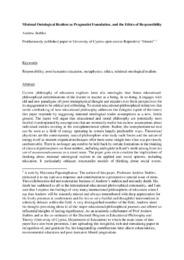Minimal Ontological Realism as Pragmatist Foundation, and the Ethics of Responsibility

View/
Date
2021-12-21Google Scholar check
Keyword(s):
Metadata
Show full item recordAbstract
Current philosophy of education explores inter alia ontologies that frame educational-philosophical determinations of the learner or teacher as a being. In so doing, it engages with old and new paradigms of (post-)metaphysical thought and requires ever fresh perspectives for its engagement to be critical and refreshing. To recent educational-philosophical initiatives that invite a rethinking of how educational philosophy addresses the Zeitgeist (spirit of the times) this paper responds by suggesting minimal ontological realist assumptions as a new, fertile ground. The paper will argue that educational and moral philosophy are potentially most fruitful if underpinned by assumptions that are minimally realist but eschew assumptions about individual entities existing in the extraphenomenal sphere. Rather, the extraphenomenal real can be seen as a field of energy operating in certain largely predictable ways. Theoretical physicists are the contemporary natural philosophers who study such forces and the nature of energy itself as modern empirical techniques offer them some insight into what was previously unobservable. There is no longer any need to be held back by certain limitations in the thinking of classical philosophers on these matters, including ambiguity in Kant’s work arising from his use of noumenon/noumena as a count noun. The paper goes on to consider the implications of thinking about minimal ontological realism in the applied and social spheres, including education. It particularly critiques structuralist models of thinking about social events, especially those that emphasise the importance of hidden, deep structures that drive surface events.
Collections
Cite as
The following license files are associated with this item:

